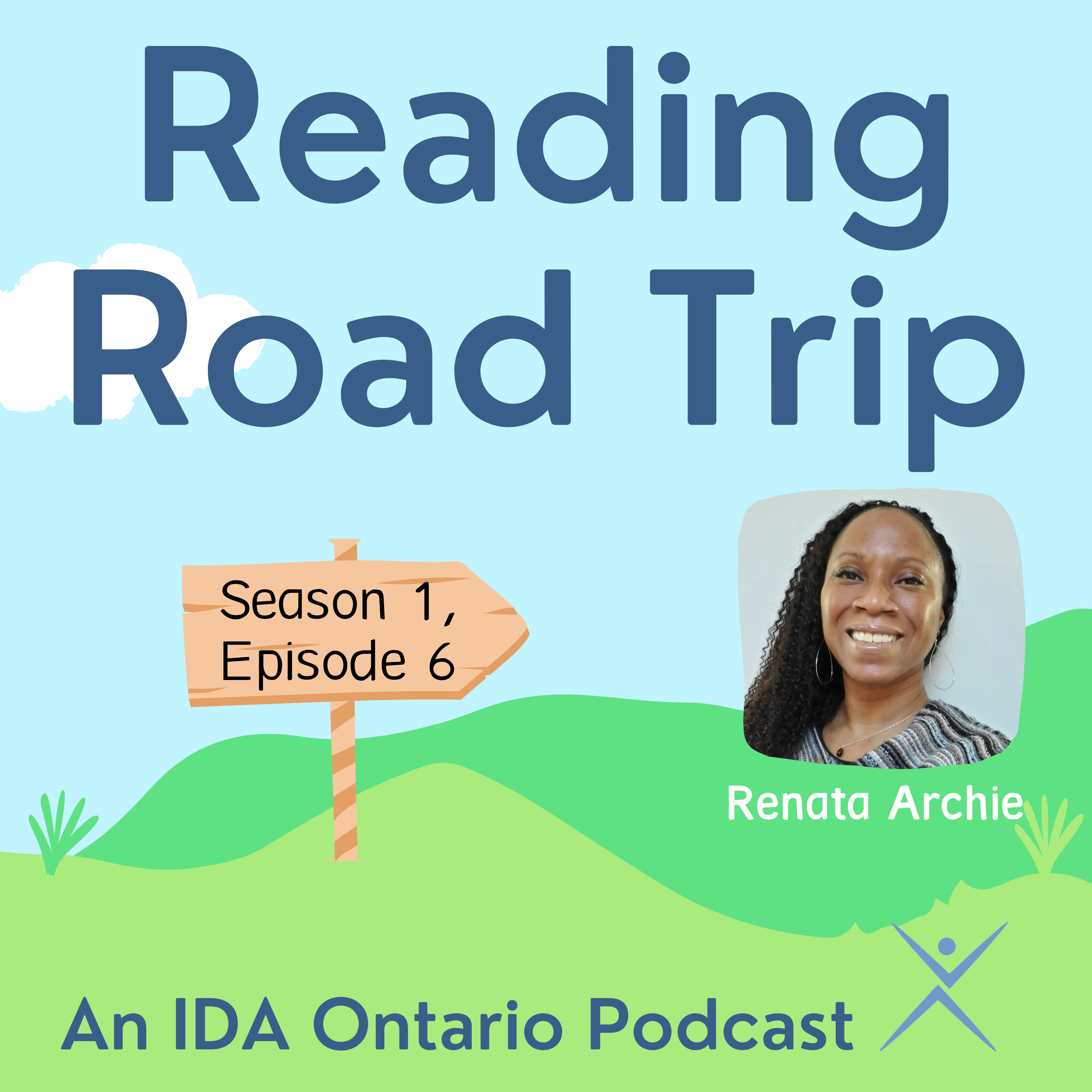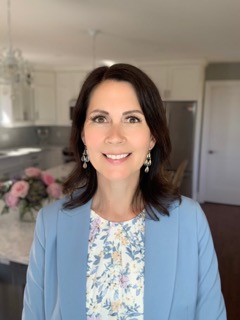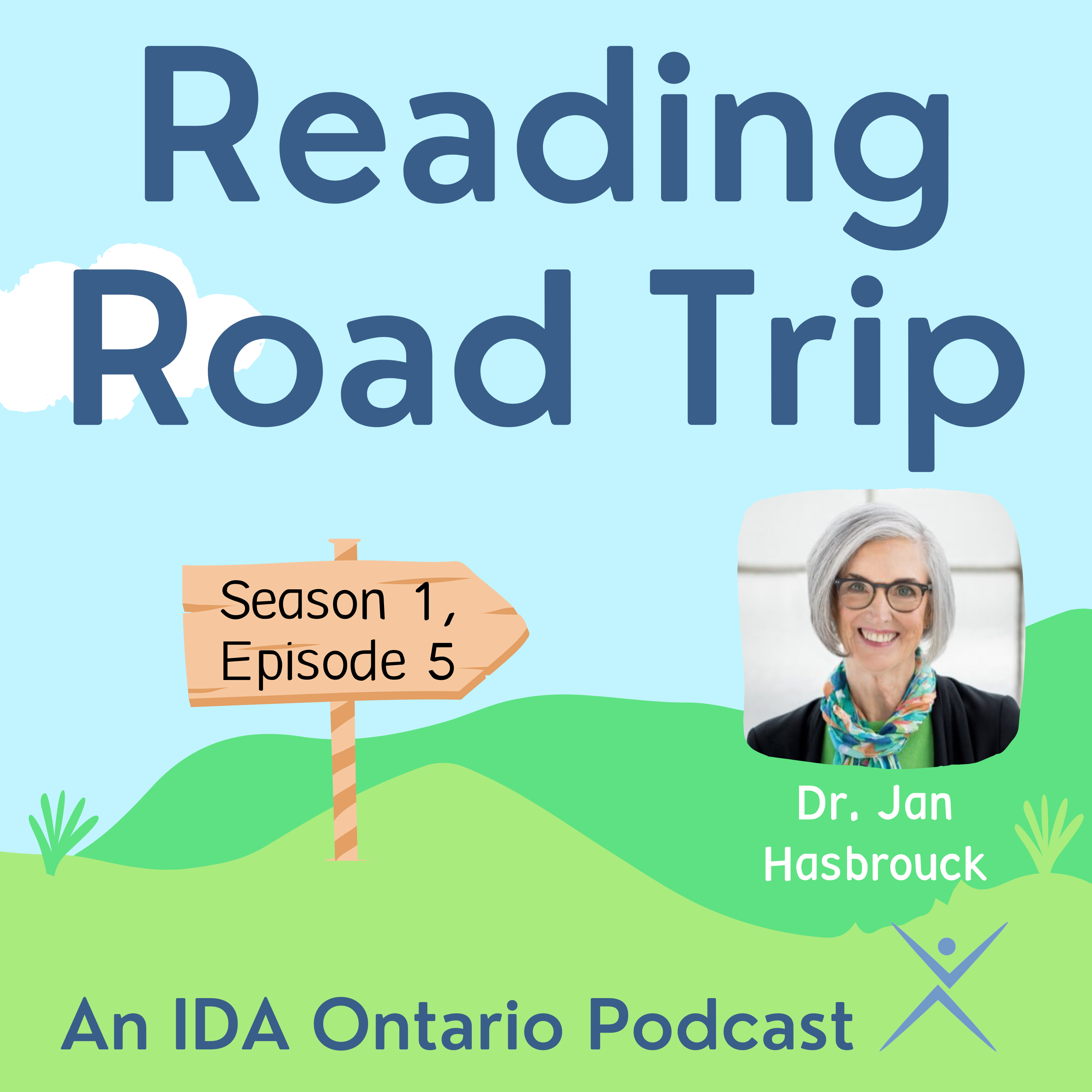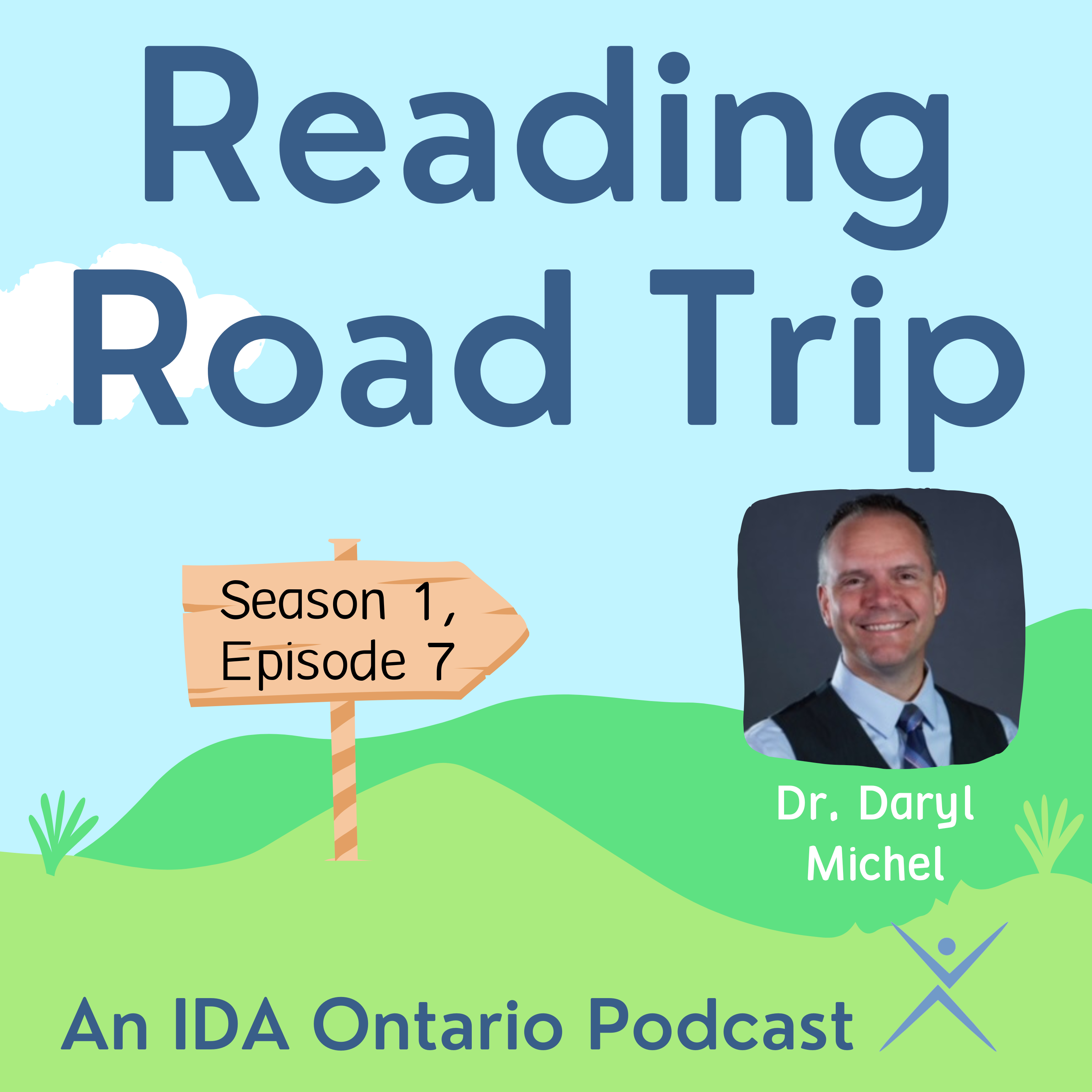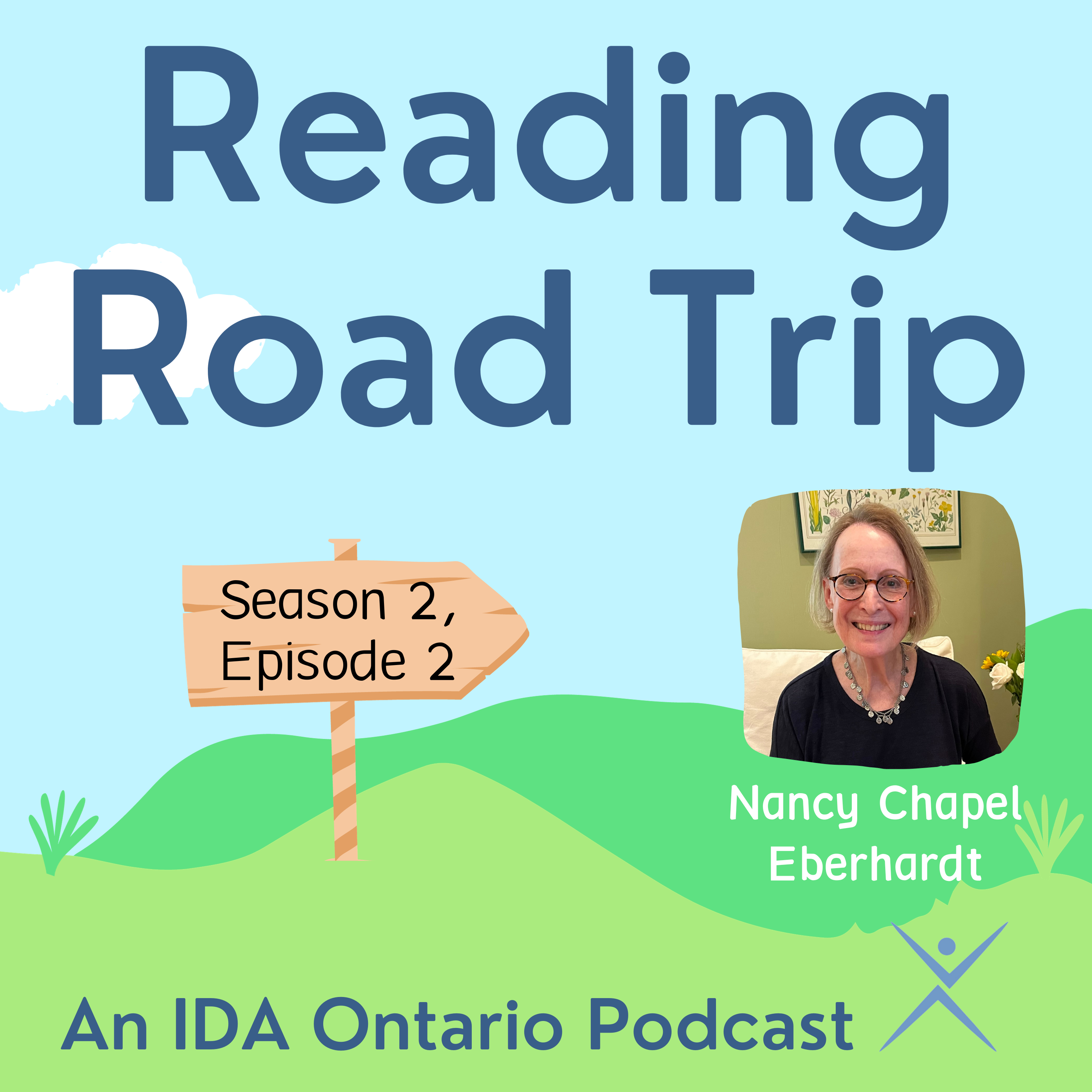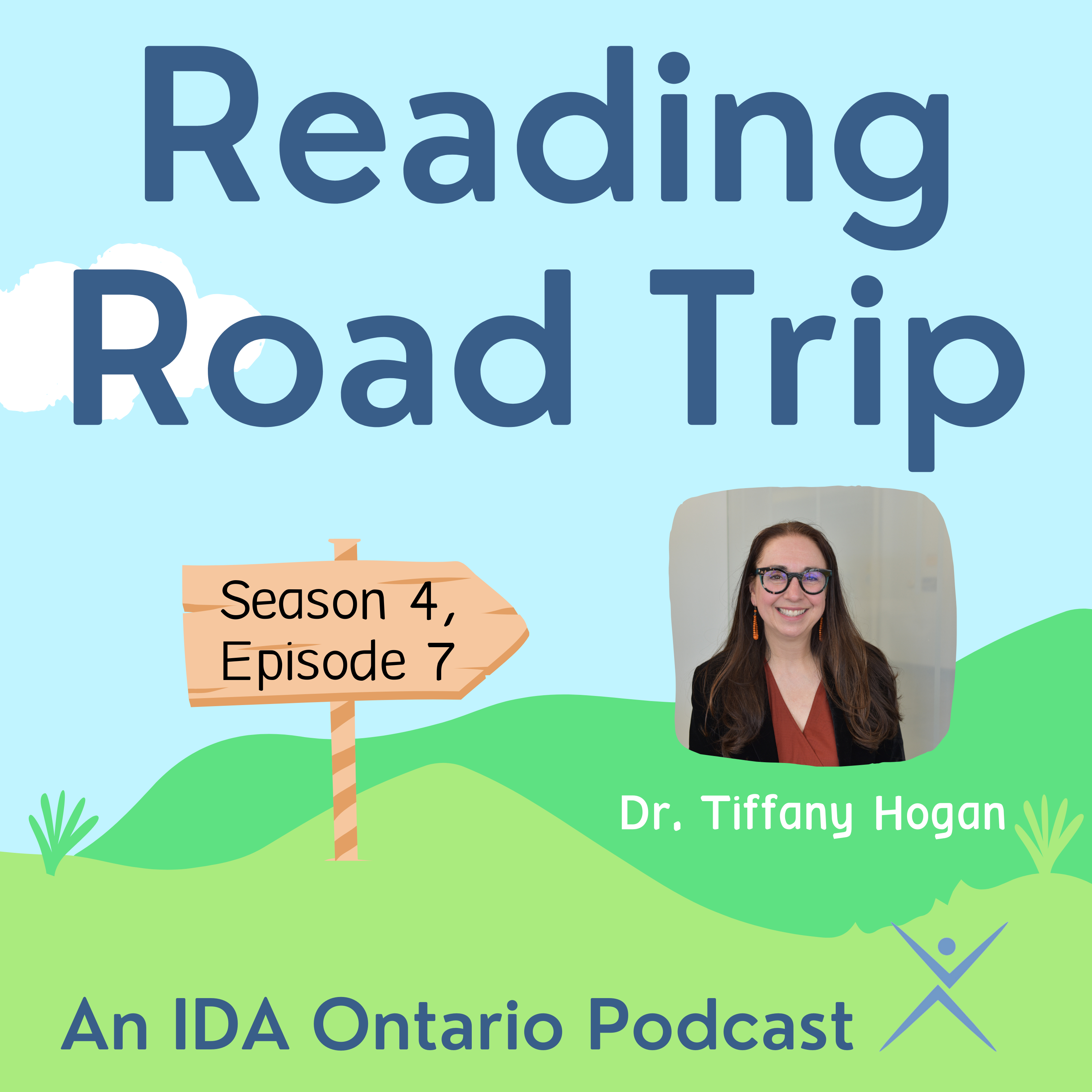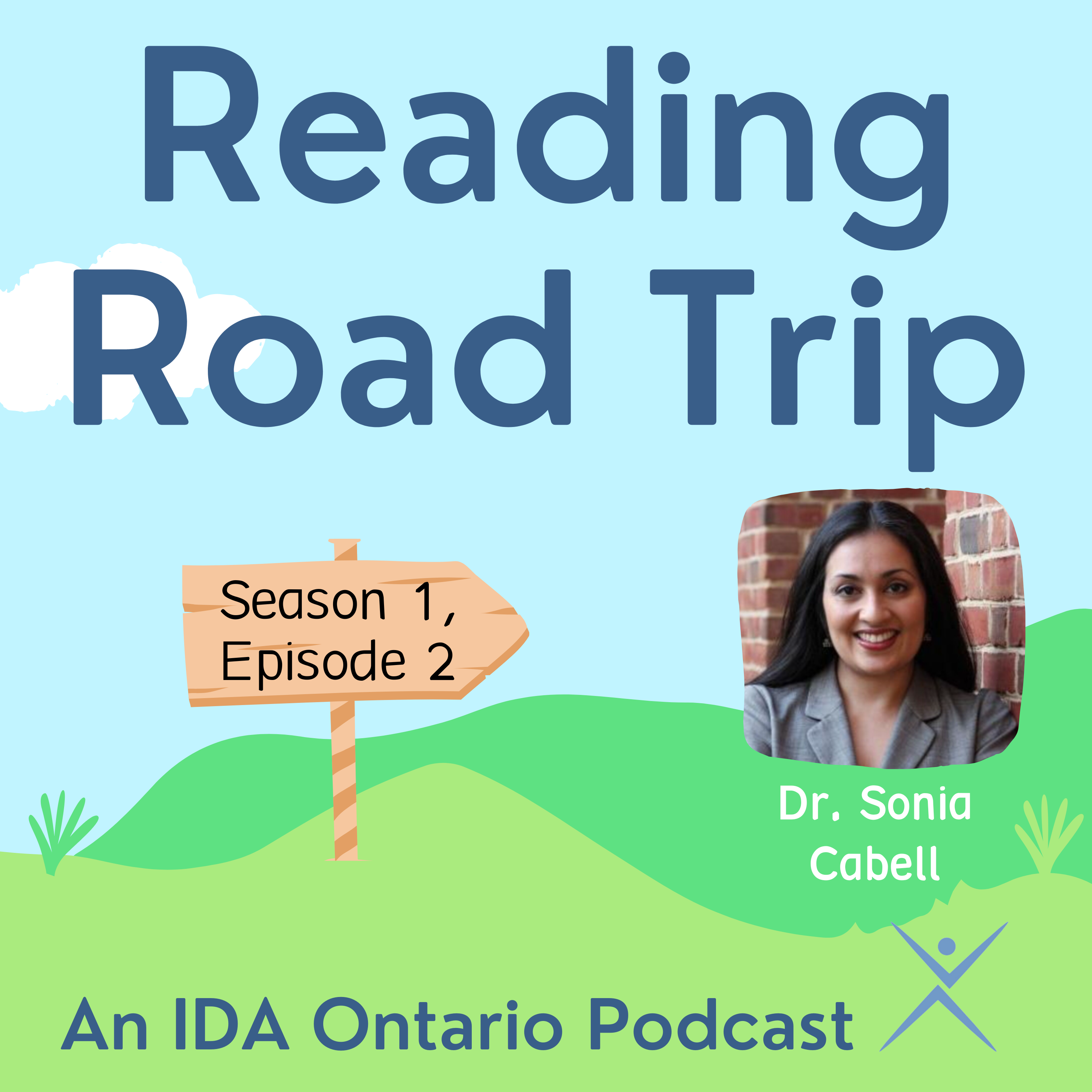Episode Transcript
Kate Winn 00:00:05 Hello to all you travelers out there on the road to evidence-based literacy instruction. I'm Kate Winn, classroom teacher and host of IDA Ontario’s new podcast Reading Road Trip. Welcome to the show. This is episode six of our very first season. Before we get started, we would like to acknowledge that we are recording this podcast from the traditional land of the Mississauga Anishnabe. We are grateful to live here and thank the generations of First Nations people for their care for and teachings about the Earth. We also recognize the contributions of Metis, Inuit, and other Indigenous Peoples in shaping our community and country. Along with this acknowledgement and in the spirit of truth and reconciliation, we'd like to amplify the work of an Indigenous artist. And this week we are sharing Be a Good Ancestor by Leona Prince and Gabrielle Prince Illustrated by Carla Joseph, rooted in indigenous teachings.
Kate Winn 00:01:04 This stunning picture book encourages readers of all ages to consider the ways in which they live in connection to the world around them and to think deeply about their behaviours. Add this one to your home or classroom library today. And now on with the show. I am so excited to introduce our guest here this week, Renata Archie. Renata is the Academic Intervention Services Coordinator for a New York City public school district. She supports a portfolio of elementary schools and principals with literacy assessment, data analysis, intervention, and strengthening instructional leadership team practices. She has been instrumental in supporting the district's school building leaders and classroom teachers in learning about evidence-based literacy practices and MTSS. With 24 years in education, Renata has worked as a classroom teacher, K - 2 instructional coach and dance educator. Renata is a doctoral student in Mount St. Joseph's reading science program.
Kate Winn 00:02:02 She's passionate about all things MTSS and especially the use of evidence-based decision-making to improve K - 2 literacy outcomes. Outside of work and school, Renata is a mom to an 18-year-old son who will be heading to the University of Southern California in the fall. Renata is originally from Northern California and is an alumna of UC Berkeley. She's a classically trained musician and dancer and enjoys gardening, skiing, cooking, and tennis. In her free time, she looks forward to more free time for these activities once her dissertation is complete, which I'm sure is true. Welcome to the show, Renata.
Renata Archie 00:02:38 Thank you. I'm glad to be here. I'm honored to be asked to do this. So nice to meet you.
Kate Winn 00:02:44 And I know my esteemed co-producer, Una Malcolm, also the President now of IDA Ontario is in the same doctoral program as you, and she just raves about you and thought you would be perfect to have on the show. So I'm excited to get started.
Here's the first question.
So I know like you've got a broad area of expertise with a lot of this K - 2 stuff, but what I really want to dig into first is screening. And for those of us in Ontario, we know that that universal screening has been mandated for our year two kindergarten students, which would be your year K in the states up to our grade two. And that was one of the major areas of inquiry for our Right to Read from the OHRC. So, could you unpack the idea of universal screening for us a little bit? How is it different from ways we have assessed reading in the past, and why is it so important that we screen?
Renata Archie 00:03:33 So there's a, as you know, there's a wealth about 50 years of research now, um, helping us understand how to teach reading. And part of that, um, is prevention. So some of the assessments that I know as a young teacher were available to me, weren't necessarily giving me rich information about essential literacy skills that were predictive of later outcomes for children. So what universal screening, as it's said, universal, all children are screened three times a year, in the beginning of the year, middle and the end. The definition of a screener is that it's brief, meaning it's not taking 30, 40, 90 minutes to administer. And it is collecting information about specific skills that can tell you about that student at that time of year, at that grade level, that's gonna be beneficial, and it's something that a teacher can move on immediately.
Renata Archie 00:04:33 So it's meant to flag students who are at risk for later difficulties. So that is the, um, most important thing about a screener. The other important thing, I'm not sure if you guys will be using Acadience, but there, there are various types of screeners, but that they are valid, meaning that the screener actually collects the information that it's meant to collect. People may have heard the word reliable. That means that if it's used over and over again by different, um, educators, it will give consistent outcomes so that you can trust that it's collecting what it should be. So it should be valid, reliable, brief, and efficient, and collect information about those really important skills. So that is why, uh, like your province, um, even New York City, um, is moving towards making sure K - 2 students are screened, because at a certain point, those very, very essential skills, if the students have not mastered them, um, then we end up in a, in a situation where we're having reading difficulties that we have to remediate.
Kate Winn 00:05:44 Thank you. And just to follow up, you did mention Acadience, so I know that's what I use, that's what my board is going with. I know some in Ontario are going with DIBELS as well, which is similar. Um, is a screener something that a board could just kind of create on their own and use that as their universal screener?
Renata Archie 00:05:59 No. So, um, there's a website at the end, hopefully you can post the podcast with some links and resources. Um, so the researchers who did all of the 30 years of research behind DIBELS are also the same researchers who now are behind Acadience. So a lot of time and resources go have gone into understanding what needs to be measured for a child. So kindergarten, I know that you taught kindergarten, I taught kindergarten for many years. There's specific skills we want those little ones to know by a certain time. And throughout the year, those skills may change. So researchers determining which skills are we asking students to have mastered, where would we like them to be with that skill? So you can't necessarily just make up one, you know, educators can't just sit down and say, you know, let's assess this and be kind of fuzzy about it. It does need to be evidence-based, because we know that that skill in particular is something that will help us know how a child may read later in second or grade two or grade three.
Kate Winn 00:07:12 Great. So we know that the screening itself, I mean, just that data isn't alone going to be the piece that changes student outcomes. It's obviously the instruction that we provide. So, how can we take our screening data to determine what we're doing in small instructional groups to try to, to get the best outcomes for those kids instead of just, you know, okay, I did my screening and you know, maybe I've got my piece of paper, or I've got it entered into the computer, and then I'm gonna close it and go about my business. We don't want that, right? We wanna actually use that data. So how can we use that to help inform our small group instruction? And why would we use this instead of say, guided reading levels?
Renata Archie 00:07:52 Yes. So the piece, you have the collection of the data and then the instruction, but the piece in between is the data-based decision making, um, the conversations we have as educators to make those instructional decisions. And so that's a big part of what I do each day. So after the data are collected, uh, whether it be teacher teams, whether it be teachers on their own, sometimes schools will have an instructional leadership team, the process of data analysis, looking at the data and determining what's happening with my students. So you are, you're maybe looking at, you may be looking at the data on the individual level, looking at students who fall into a zone where they're struggling with specific skills, maybe like a group.
Renata Archie 00:08:49 Um, and you may be looking at your whole class. Often there you may look across the whole class and realize that there's something awry that needs to be addressed with instruction. So that process of understanding what you've collected is very much connected to teacher content knowledge. Also, we have to know what it is that we've collected, what's the implication of it for my instruction. So with that information, you can now target your whole group instruction. You can also create groups that are more meaningful, um, in the sense that the instruction is geared towards what those specific students need. Um, and you can also see it whether systematic issues maybe across your school or grade. Um, maybe my teachers need training in this lesson. So you may be able to determine those things based on the data you find. So now at after that point, then you're going to implement instruction for all the students.
Renata Archie 00:09:49 You asked about the groupings. Acadience has some grouping sheets. I think you mentioned those that are helpful for that initial organizing of the students. And so for every grade, K, one and two, they help you organize the students into four different groups based on specific skills or skill measures at that time of year. So that's like the first step a teacher would take. It's not the last, but it helps you get started. And after that, I'm not sure if your teachers are familiar with the outcomes-driven model or different frameworks for problem solving. So that, and I'll talk about that more a little bit later, but I mention it because asks you to question, do I have all the information I need? So if I gathered all this information about my kindergarten class, and I've used my group in sheets to now organize them into different, four different groups that help me understand where they may be struggling, I might need some more information about a specific group of students to help me now plan for instruction.
Kate Winn 00:11:10 Yeah, no, that's great. So, I mean, for some kids, we might be moving on to that diagnostic assessment piece, right, where we're trying to dig in a little bit deeper to see, to see what is going on there. Um, and so with that data from the screener, why is it important to use that kind of data as opposed to, you know, getting our reading level and grouping kids, you know, I'm gonna have my C'S together and my D'S together. Why do we not wanna base it on that?
Renata Archie 00:11:35 Yes. So I know throughout a lot of our careers, at least when I was a younger teacher my school and the consultants that assisted me approached literacy from a balanced literacy approach. We had guided reading, we had reading levels, we had levelled text. At this point, what we understand now about levelled text, I'll start with those, those little books that we call AA, A, B, C, they often are not set up to allow students to practice the decoding skills that they've been learning in their phonics lessons.They also may include words and patterns that students have not been exposed to or taught. They're a little bit problematic, the way the books are written and the kind of text, it's not that children can't read them later on, but when we have emerging readers that we'd like them to have repeated successful opportunities to read, and get fluent using their phonemic awareness and phonic skills as they do it, they're not the best text.
Renata Archie 00:12:53 So the concept of leveling students into readers, like these students are B readers, or these students are C readers, it's a little arbitrary. It's something that we all had to kind of unlearn. Even parents still ask me, oh, what level is my child? And I try to massage them into understanding, here are the skills that I need your little one to master, here's how you can help at home. So it's a different way of looking at it. We want teachers and parents to understand these are the components, these are the skills that help a child become a fluent decode decoder of a code-based alphabetic system. And once we get there, they'll be able to read anything eventually. So it's more of the lens through which you see it, the leveling of students is not telling me what skill they need. The cueing system of looking at the kind of mistakes they're making doesn't fit into this evidence-based practice that I'm talking about. So we really want educators to think more about, do they have phonemic awareness skills? Um, are they able to, uh, segment, blend, are they able to decode, um, all of that as opposed to teaching them to maybe guess at words? And that's probably another podcast, <laugh>.
Kate Winn 00:14:28 Yes, for sure. Um, okay, so we've screened, we've got our data, we've planned out, we know what's happening, whole group. We've got our kids grouped into, you know, their different groups. So what does that small group instruction look like? And then also the million dollar question, everyone wants to know, what are the other kids doing during small group instruction?
Renata Archie 00:14:48 So the small group based on, I'll use kindergarten because that is the grade I have the most affinity towards. So we know that kindergarten students need a lot more support in the beginning, you know, from that fall to winter time period, because they're often new to the classroom setting. So what I will start with, with the lower grades is that everything you do, routines, the concept of getting into groups has to be modeled, has to be explicitly explained to them so that they understand. So whatever activity you're gonna plan for your groups has to be explained to all of the children. This is you doing yourself a favour or you will end up stressed out with not understanding what's happening. So with that being said, it does take time and it takes you being very well-organized and well-planned.
Renata Archie 00:15:50 So when you've placed students into groups, you're going to plan activities that are aligned to assisting them with those skills they're struggling with, giving them repeated opportunities for practice. So that doesn't mean you're sitting in a group for a long time. It could be a matter of 10 to 12 minutes, and you may rotate, you may see a group twice a week. You may see a group three times a week, but they're getting that very specific support in something that they need and an opportunity to repeatedly practice and succeed. I keep saying that because as a young teacher, you know, we were all told different things. It's actually not okay to let students, they're going to make mistakes, but we want immediate corrective feedback so that now their, their mouth, their ears, everything they're producing is, is accurate, and the more accurate, then it's mapping onto their minds in the right way.
Renata Archie 00:16:50 It's more difficult for us to unlearn, even adults, for us to unlearn something that we've practiced. So with that being said, planning for the students, things that are aligned, that are appropriate. We spoke earlier about some activities that we may think are very simple, but students do need support with them. So yes, for kindergarten it is more difficult, it can work, but definitely introducing them to any activity that's aligned to what they need that they are able to do on their own. And we are not gonna be able to leave them there for a long time. Maybe you have a rotation. I'm not a super big fan of technology, but there are some good, nice things that have been created. So, um, a teacher would need to very thoughtfully plan several activities that the children could rotate through.
Renata Archie 00:17:44 But all of those activities, all of the students would, would need to be familiar with. What are the expectations, what are the behaviour expectations when I'm there. I've seen teachers, awesome teachers in my district, they have systems in place with bells. They'll have little <laugh> signs where the children know, if I have my little sign up, I'm working with my group. So it does take time, but it's wonderful when that gets into place. So I hope that answered the question that you can sit, you know, 10 to 15 minutes with a group and rotate to another one. But as long as all other students know what the expectations are they can't be doing activities that need heavy support from an adult.
Kate Winn 00:18:37 Thank you. And I know there are some teachers who have, you know, really organized systems in place for that kind of group rotation. And, and I think some things that, that maybe stem sort of from balanced literacy, the Daily Five approach or the CAFE approach, that sort of thing. But I think what I'm hearing from you is what they need to be doing in their groups is something evidence-based, it needs to be what they should be working on and also should be something that they can definitely do independently without teacher assistance. Does that sound right?
Renata Archie 00:19:06 Yes. Yes. And maybe it has an accountability piece. They interact with the activity and maybe there’s something that they need to be able to show at the end when we all come back together, all the groups need to share something, so it's meaningful all the way through.
Kate Winn 00:19:33 Yeah. Okay. And I had another question that you actually answered, partway through your answer. So it doesn't seem like every child needs to be seen every day for the same amount of time, 'cause I think that's kind of from some of those rotational things too. It's like, well, I'm gonna do 10 minutes a day with every group and ring the bell and rotate. But that's not necessarily addressing the needs of the individual kids, right?
Renata Archie 00:19:53 Not necessarily. You're going to get screener data. You have children who are meeting benchmark and above, they need you, and they need to be in a small group as well. But you also have students who are even hovering at benchmark or below benchmark and may need additional support, or there's a more rudimentary skill they need extra practice with. So you're gonna be setting up and delivering what all your children need based on that. And that means intensity, right? That even that kind of thinking also goes into progress monitoring. So nothing's cookie cutter.
Kate Winn 00:20:39 I wanted to ask, so we've, you mentioned MTSS earlier and I know in Ontario it's becoming more common language, the idea, talking about Tier 1 and Tier 2 and Tier 3, and I feel like Tier 1 we kind of have a grasp of, you know, sort of your whole group and your universal thing happening in your class with everybody. The Tier 3, like when I'm thinking of Tier 3, I'm thinking, for example, of our special education resource teachers who take a small group of students from the school for one hour every day for Empower, which is an intensive remedial reading program. To me, I feel like that's Tier 3. I'm kind of wondering about sort of that Tier 2 line, because I'm thinking about things even that I do in my class. So some tier, some small group activities to me would be part of Tier 1.
Kate Winn 00:21:24 They're just part of that universal instruction, but you're just doing things with a small group. So I'm thinking about, I take usually a writing group and it, it's not even necessarily a homogeneous writing group, so I just take a few kids at a time. And last year I was trying to use the Rising Star Scaffolding Guide from Dr. Sonia Cabell and some of her colleagues where you kind of prompt each kid based on where they are with their writing. And so with some kids, they might have a beautiful sentence written, and I'm saying, okay, can you extend that, tell me where it happened or when it happened. And then some kids are just trying to write the word dog.
Kate Winn 00:21:59 And so you're saying, what's the first sound you hear in dog and whatever. That's kind of part of what I consider Tier 1, 'cause everybody's getting all this writing instruction, but then I think about a little guy where I took him from the start of the year one to one, several minutes every day. And we were methodically going through those letters and sounds because he was in the first year of kindergarten last year, and it wasn't clicking. And so I thought, okay, we gotta up the intensity, and it almost, to me, that almost felt like doing Tier 2 in the classroom. Does that make sense? That, that there are some things that a classroom teacher could do that are kind of getting into the Tier 2 realm?
Renata Archie 00:22:39 That makes sense. I do want to talk really quickly across the Tiers 1, 2, and 3, and then talk about Tier 2 so the listeners understand - Tier 1, if we have constructed it well, and all that we've been talking about so far is meant to be able to get almost 80% of your students to benchmark, where we want them to get, but you're gonna always have students, like you were saying, who may not be responding or it's not enough to get them where we want to. So they need Tier 2 support, what the Tier 2 support is in addition to what they're already getting. So Tier 1 includes whole group and small group, like you said. Now Tier 2 is gonna be something additional that I needed, some just additional practice, and that's gonna be small group, um, maybe a little smaller than your Tier 1.
Renata Archie 00:23:32 So yes, teachers can deliver that. I get concerned sometimes about teachers being overwhelmed. So where I mentioned MTSS before, where all adults and educators in the building are participating in this conversation, um, and have access to the student data. So the classroom teacher can definitely deliver it if it works into the schedule. We have to be creative if we have assistant teachers, if we have outta classroom folks, that planning can happen together, or even the Tier 2 delivery could be shared. So there's many ways to do it. Tier 3, like you said, once you've gone over the weeks looking at the data and seeing that that child still is not responding to that additional, more intensive support you've put in place, then we end up in need of Tier 3, which is gonna be a smaller group.
Renata Archie 00:24:38 Sometimes it's one-on-one, sometimes it's a very small group, and it's more intense daily, like you said. That response to Tier 3 supports sometimes outside classroom teachers and another team may be paying attention to that to see if there is some need for special education support. So that's how the tiers work. I know some of the listeners may imagine they've seen that, that pyramid with the green on the bottom and the yellow and the red, which basically lays out the 80%. And just to not confuse them we're not saying that 80% of the students fit here and 20% fit here, and 5% here. It's just a kind of suggested model of reflecting the health of our system, the health of our instructional and assessment system, if that makes sense.
Renata Archie 00:25:34 So yes, definitely classroom teachers can deliver Tier 2. I as a, I always go back to kindergarten classroom. Um, it's a lively classroom. When I think about a student not responding to my universal instruction for all, I would like it to be a calmer, quieter environment. Each school would have to be creative in how to do that. So yes, it's possible. I would rather if my students were maybe in another place, maybe they're at library, maybe they're somewhere else, and then I can pull that group for additional and it's a little quieter, but that's just my ideas.
Kate Winn 00:26:13 We're lucky in Ontario, the way the kindergarten program works, it's a partnership between two adults. So there's that Ontario certified teacher, and there's also the early childhood educator. And so there are two adults as a team in every kindergarten class. So we get really creative with that in terms of when I've got the kids in, my partner does something and my partner has the kids, and then I can do something. So yeah, that definitely happens like that, working with that one little guy was definitely in an empty space, <laugh>.
Renata Archie 00:26:40 I love that.
Kate Winn 00:26:42 Yeah. Yeah. And also, I mean, practically speaking, we would love that, you know, as soon as we screened and we saw some need, our child wasn't responding with Tier 1, we'd love to kind of get special education help or whatever, but we just know in terms of bodies, in terms of funding, we know that's not going to be possible, right? So it is great if teachers are able to kind of start that process, but you're right, in a busy kindergarten class, it, it's definitely hard to pull a child and get them to focus on something like that.
So you mentioned progress monitoring, which is great because I do wanna talk about that next. So we're, we're doing our, our small group stuff. We might be, you know, targeting certain things to certain kids. How do we know it's working? What do we do?
Renata Archie 00:27:21 Mm-hmm. <affirmative>. So one thing that I am trying to help my schools here in New York City do is the creation of something called decision rules. So in this summertime when school’s not in session, um, instructional leaders sitting down and teachers to organize when we get this data, using the grouping sheets, but what else helps us determine which children need this group or that group or this kind of support. So having those conversations is key, having those decision rules and understanding is first and foremost. And then that includes making a plan for progress monitoring. So, if you have students who are struggling with certain skills, the plan for how often will I collect some additional data across the months, um, to make sure you are responding? So I'll take one of the kindergarten measures.
Renata Archie 00:28:24 They do first sound fluency in the fall. A lot of children come in and they don't really know how to do that, but we know we're teaching that right now. So I may be progress monitoring just to make sure based on my instruction, that the children are picking up. And you may have students falling into that scenario that need Tier 2 support. Maybe they need additional, so I may progress monitor them more often. Maybe it's every week, once a week, just a quick little snap. Or maybe it's every other week. Those are the kinds of decisions that the school needs to make based on how a child is doing, how a child is responding, how severe heir status is in terms of meeting benchmark. We're basically not going to wait, you know, we do the three times a year, beginning of the year and middle of the year.
Renata Archie 00:29:18 I'm not gonna screen you in the beginning and then have instruction the whole time and then collect again in the middle. I need to know how you're doing because something might not be working out for you, and I need to be aware. So that's the purpose of progress monitoring. And it helps us adjust our instruction based on what children need. Sometimes a child is now in a group and they have got it, so that's why we need, we call it flexible grouping. So, you might not need this anymore, and you can move to a different group. So that's how it helps us. And it's going to be different for more, more intense or more frequent or less intense or less frequent, depending on the student.
Kate Winn 00:29:57 And I think it's good for listeners to know too. I mean, we talked about a couple of examples of universal screeners. We mentioned Acadience, we mentioned DIBELS. They have progress monitoring forms. So you're not trying to make this up on your own to, you know, check in and see where the kid is. They actually have forms that you can use. So I mean, I think with Acadience, there may be like 20 forms that take you through the year to progress monitor 20 times if need be. Right? So you can find those resources there. And also, I mean, if a child was at or above benchmark at the beginning of the year, we wouldn't necessarily need to progress monitor them. We're progress monitoring the kids who maybe were flagged because they were below or well below benchmark,
Renata Archie 00:30:34 Yeah. And I mean, something I've seen, so you may have a child who's, let me think of another measure for K - 1, phoneme segmentation fluency, or even the nonsense word fluency. Certain skills, the nonsense word, we want the children to get better and better and more fluent and more masterful at it. If my instruction is not bolstering that skill, you might have a child who shows they’re at benchmark. I always tell teachers, look at where there's a little carat, look at where the child is actually falling in relation to benchmark. They could be very close to it. Um, don't let the green fool you. It makes you think like, oh, I've arrived, maybe. But we always say reading is a moving target, and as a child, you know, gets six months older, we want those skills to be even better. So sometimes you may have a child who meets benchmark, and then in the middle of the year, you see they fell below, and it may be not that they are not doing as well, it's that they had not, maybe they had not improved. So those sorts of things we wanna make sure, um, teachers pay attention to.
Kate Winn 00:31:54 Yeah, that's a really good point. I know I was working with one teacher and we were doing the oral reading fluency assessment, and then it showed that over time, this child's words correct per minute had gone up. However, they went from green to yellow. And so the teacher was asking, I don't understand, like they got better. So how come now they're yellow, but the target moves throughout the year, right? For where they're expected to be at, beginning and middle and end. So yes, they have to keep that trajectory up in order to stay at or above benchmark. That's a great point. The next thing I'm gonna ask you about is, so in Ontario, as I mentioned, we're working with recommendations from the Right to Read inquiry from the Ontario Human Rights Commission. They included this early screening as one of their key recommendations, for year two, kindergarten through grade two, and emphasized that screening makes a positive contribution to equitable practices. It's a way to address implicit bias or possibly lowered expectations for students from those equity-seeking groups. But despite all of this information, there's still some concerns from some that screening is not feasible or perhaps desirable with culturally or linguistically diverse children. So what can you tell us about, you know, what the research says about that, but also I know you work in a context with that incredible cultural and linguistic diversity. So how have you seen screening kind of intersecting with the population of students you work with?
Renata Archie 00:33:15 Yes. I actually am just now hearing about this concern, and I'll hear it a little bit from some of our special education teachers. So with English, English language learners, or I'm sure you know, where, where you, you guys are in Canada, there's many different language languages and varieties and home languages. If the goal is to become a fluent reader and writer of the English language, there's certain things that a student needs to master. So that is a hands down, just a non-negotiable. So I think some of it is more understanding, um, what the goal is or what the purpose is, like what we spoke about initially in the podcast. Like what's the purpose of this screener? It's not an SAT score. It's not something that is punitive. It's a tool for a teacher. It’s been equated to like a GPS or a thermometer where this student is with this skill in relation to where they need to be to become that fluent reader.
Renata Archie 00:34:34 And that's for any child if we'd like them to become a reader. And we know literacy is literacy and becoming literate is a social justice issue. We'd like all humans to be able to function and be literate and be wonderful, you know, participants in society, but they need to have that skill. So when it comes to English language learners, there's other considerations. I’d point listeners to the work of Dr. Antonio Fierro, here we have a lot of Spanish speakers, but still the work that they've done around it is poignant. It is rich. Dr. Elsa Cárdenas-Hagan. Structured literacy, the approach that is necessary for all students is necessary for learners who are coming from a different home language or even language varieties. I think it's more of an issue of understanding what the goal is.
Renata Archie 00:35:38 If we can all agree that the goal is for children to become fluent readers, here are the things that they need to have, then a screener and certain types of assessments are tools, nothing more than that, that can help a teacher. Yes, there are exceptions for certain students with certain disabilities that the screener may not be the best. But what we want classroom teachers to understand about the students that are coming to you with a different home language, that to me is the big issue. So your charge as a classroom teacher is to get to know all your students, and especially students coming with a different home language or language variety, delivering very robust instruction to all students, and making sure you are enriching their receptive and expressive language while learning about their language. So that is the responsibility of the adult to become much more aware so that the instruction you're delivering and even the conversations you have, or any additional scaffolds or conversation or vocabulary or visuals or things you use now help to support that child to land right there with their peers.
Kate Winn 00:37:13 I love how you mentioned a couple times, understanding kind of about screeners, because I think for some people too, if they aren't fully informed about universal screening, they think, oh, this child is going to be flagged and diagnosed with dyslexia at the beginning of kindergarten, and it's because of a difference with home language or something. That's not how this works. I mean, you use the thermometer analogy, right? Like, no, no, we just wanna take their temperature. If they're at risk, we'll figure out what's going on from there. Like, we're not slapping labels on anybody because of a screener. What we're really trying to do is, is to help them, right? That was an excellent point that you made there. Speaking of your excellent points, wondering now if you could just share, you know, any lessons you've learned, you are a few steps ahead of where we are in Ontario, but I think also other provinces, other states, you know, many places where they're not really full steam ahead with this universal screening process yet. So lessons you've learned, wisdom that you wanna share with us as we keep moving along.
Renata Archie 00:38:11 Yes. Um, so first is to know this is a multi-year journey. So we did get started here in this city, but it's a multi-year journey. Uh, when I spoke about MTSS, making sure all educators first are fully trained in whatever screener you're gonna be using and have a good understanding across your school building of the components of MTSS, what the full goal is. So this screener is one thing, but it fits within the context of a school-wide assessment system, a way of thinking and a way of functioning. So those are some of the things that I know. We are trying to help our schools get into motion, everyone understanding what this is all about and working collaboratively, making sure, I'm certified as an Acadience mentor, so is my, my classmate, Una, making sure someone in the building or two or three become a certified, um, either Acadience mentor or whatever system you're using.
Renata Archie 00:39:18 And that helps build the capacity and sustainability. You want to have refresher trainings, um, throughout the year, someone who can do the fidelity checks to make sure the assessments being administered properly to make sure we're all doing it the same way here and there. Unless you talk to people, you'll realize there's some misunderstandings and sometimes it falls through the crack when you're trying to train many, many educators at once, you know, across our entire city. So those are really some of the biggest key things to have in place to begin with. The other part after that's collected is setting up those teacher teams and instructional leadership teams that are going to have an approach to analyzing the data or else, like you said earlier, it's just collected and we're sitting here going, what, what do I do with this? So I'd say those are the first, first big steps. And it does, it takes time. It takes time, yeah. Oh, and coaches, <laugh> coaches, if possible. I know it for sure.
Kate Winn 00:40:27 Yeah. Um, I was actually trained as a mentor a few months ago, and then had the opportunity to train some educators at our board with Acadience, which is great. And you're right, there is a lot to it. And making sure that training piece is there and the support piece is there because the data is only good to us if it's, as you mentioned before, reliable and it's valid. And so if people are using all different systems and, okay, I'm gonna give them a little extra time, or I'm going to, you know, kind of do this differently or I'm not gonna mark those as incorrect because of this reason, you can't do that, right? You have to, you have to stick to the script and stick to the procedures to get data that we can compare to the benchmarks to then make good decisions. So yeah, thanks for, uh, for highlighting that, that training and support piece.
The last thing I want to ask before I let you go is what are you working on these days? I mean, your dissertation, and what's happening with you and is there anything that you want to share with listeners before we say goodbye?
Renata Archie 00:41:23 Yeah. So, as you know, I mean, I'm very concerned about stopping the cycle of ineffective practices and making sure all educators around me understand assessment and the use of data. And so even before my current position, my current position, I support principals and their entire schools with this all things MTSS and data. And, even before I got into this position, I was really concerned about the school leader, and school leaders understanding, because they're charged with really like being captain of the ship and creating that environment that can have these structures that we're describing. So my dissertation, um, which I'm, you know, Una also, we're all submerged in this until next spring. And I chose to focus on a group of principals that are underrepresented in the field and underrepresented in the empirical research.
Renata Archie 00:42:28 So I'll be looking at Black principals in the United States to understand what you call self-efficacy, their confidence in doing a particular task, you know, in order to complete a goal. If my self-efficacy is high for something I'm more apt to persist through challenges. And so self-efficacy has been researched for teachers and it's really important when it comes to the success of students. So I'll be looking at the self efficacy of Black principals, also their familiarity and experience with MTSS. Within that, I won't talk too much jargon, but I'll be looking for some correlations. So someone like me who spent 13 years as a kindergarten teacher, asking if a leader spent more time as a K - 2 teacher, did they have higher self-efficacy for things like data-based decision-making. So that's what I'm into right now, and it's gonna be interesting, all of it in efforts to understand what school leaders need and what else we can do for them in the future to make this literacy effort more successful.
Kate Winn 00:43:46 Well, that sounds fascinating and very worthwhile. So good luck with all of that, and soon we will be calling you Dr. Renata Archie. But for now, Renata Archie, thank you so much for being here with us for this episode and sharing all of your expertise. It's been such a pleasure to speak with you.
Renata Archie 00:44:02 Thank you for having me.
Kate Winn 00:44:04 Show notes for this episode with all the links and information you need can be found at podcast.idaontario.com. And you have been listening to episode six with Renata Archie. And I have to say, after Renata and I finished our official call, we had a little chat and one thing I said was, I hope we said, and made enough of a point of the fact that this screening is an amazing thing for teachers, because I know we got into, you know, a lot of the nuts and bolts and how to work with it and all of that stuff. But I can tell you as someone who has been using it in my classroom for a full year plus a little bit of the year before, um, it's incredible. It is a game changer. It makes me feel so much more empowered in terms of I know what skills kids need to learn how to read.
Kate Winn 00:44:51 I can assess and see where they are. I can target those skills. I can watch that data climbing, I can send them to the next grade, feeling confident that they're where they should be. It's unlike any other type of assessment that we have. And I really just wanna encourage teachers. If you're listening in a place like Ontario where you may be mandated to use it, please embrace it, ask all the questions you need to get the support, but you will love it once you get doing it. And then if you live somewhere where you don't have to do a screener like this, I'd really encourage you to look into it as well and perhaps give it a try because, you know, I did one PD session and I said we should make a game of every time I say game changer because universal screening for me using Acadience, but there are others, has truly been a game changer to the benefit of my students, but also to the benefit of me as a professional.
Kate Winn 00:45:42 So definitely this universal screening is a good thing. And the beauty of hosting a podcast is that when I forget to bring something up in the interview, I have this last little piece of time to share it with you. The other thing I want to mention is if you want to learn more about Universal Screening, IDA Ontario did in their Literacy Leaders series last spring, a three-part series on universal screening. So my amazing co-producer, Una Malcolm, who is also President of IDA Ontario, she facilitated and there was, you know, kind of a PD component to each of those sessions, sharing information about universal screening and really digging into that. And then two of my fellow teachers, Nellie Caruso, and Leigh Fettes and I, the three of us were the classroom teacher panel. And for each session, we talked about how we were getting ready to do screening and then what we had done with screening and then following up with progress monitoring and where things were going in the final of the three episodes.
Kate Winn 00:46:38 So we are linking to that in the show notes as well. Highly, highly recommend that if you want more information on universal screening that you do, check that out.
And now it is time for that typical end-of-the-podcast call to action. If you enjoyed this episode of Reading Roadtrip, we'd love it if you could rate and or review it in your podcast app. So there's usually a place where you can give, you know, up to five stars and you can leave a little review if you want. It's really helpful for a new podcast like ours. And of course, we welcome any social media love that you feel inspired to spread as well. Feel free to tag IDA Ontario and me, my handle is this mom loves on Twitter and Facebook and Kate this mom loves on Instagram.
Please make sure you're following the Reading Road Trip podcast in your app and watch for new episodes continuing every Monday through the summer. We could not bring Reading Roadtrip to you without behind-the-scenes support from Katelyn Hanna, Brittany Haynes and Melinda Jones at IDA Ontario. We so appreciate what they do for us. I'm Kate Winn and along with my co-producer Una Malcolm, we hope this episode of Reading Roadtrip has made your path to evidence-based literacy instruction just a little bit clearer and a lot more fun. Join us next time when we bring another fabulous guest along for the ride on Reading Road trip.
